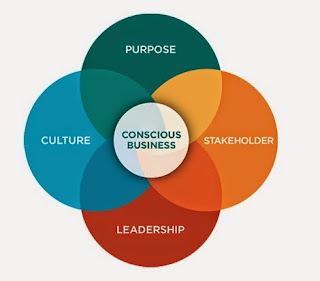The Marriott
Hotel was the site of the 2015 Conscious Capitalism Conference, an event
designed for CEOs and their leadership teams, corporate executives and
entrepreneurs. Conscious Capitalism is a movement that is gaining traction
worldwide. The purpose of this non-profit group furthers the idea that
capitalism is the most successful form of human social cooperation, and to form
like-minded communities of “Conscious Capitalists” who recognize and teach a
key principle, that business needs to create more than just revenue. It must
harmonize the interests of all stakeholders – customers, employees, vendors and
investors – in order to elevate humanity.
What the Four
Principles of Conscious Capitalism mean to Ace Metal
As an early
member of the Conscious Capitalism movement, Ace CEO Jean Pitzo has been a
proponent of its founding principles. Asked to speak at the event was an honor.
Jean said, “Conscious Capitalism has four principles; Higher Purpose,
Stakeholder Orientation, Conscious Leadership and Conscious Culture. Basically,
these are about a belief that when you build an organization based on trust and
respect for people, you are able to truly unleash potential. Everyone
understands that to succeed individually and collectively, you must share,
learn and grow together.”
At Ace, that
begins with a recognition that taking great care of customers starts with
taking great care of employees. She spoke about her path at Ace and the
potential role for Conscious Capitalism going forward. This includes continued
adoption of the Four Principles:
Higher Purpose
“Conscious
businesses” focus on a purpose beyond profit. A “Conscious business” inspires,
engages and energizes its stakeholders, employees, customers and others to
trust and even love companies that have an inspiring purpose. This is essential
for the vitality and sustainability of a business.
Stakeholder
Orientation
“Conscious
businesses” focus on their whole business ecosystem, creating and optimizing
value for all. Without a life-sustaining ecosystem, the business cannot thrive.
It begins with building an trusting and interconnected web of relationship.
Conscious
Leadership
“Conscious
leaders” see through the lens of “we”, rather than “me.” They bring out the
best in those around them. They understand that their role is to serve the
purpose of the organization. Beyond generating revenue, this includes
generating trust and fostering a healthy culture.
Conscious
Culture
In the words of
business mentor, Peter Drucker, “Culture eats strategy for lunch.” So values,
principles and practices must be woven into the fabric of a business, driving
its actions. A “Conscious culture” fosters love, care and mutual trust between
team members and other stakeholders. This is the unifying force that truly
brings Conscious Capitalism to life.
